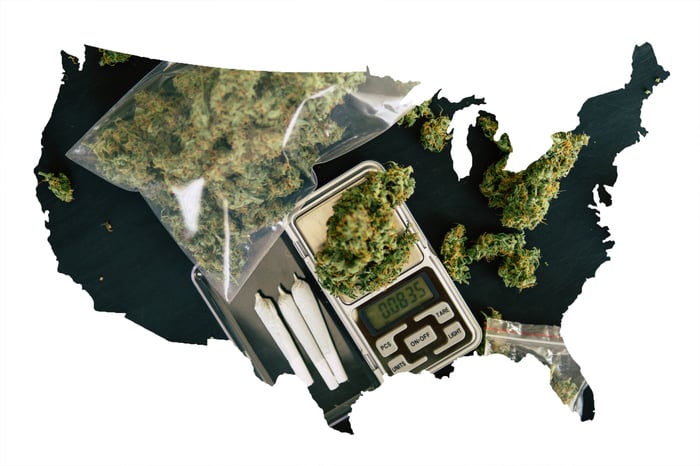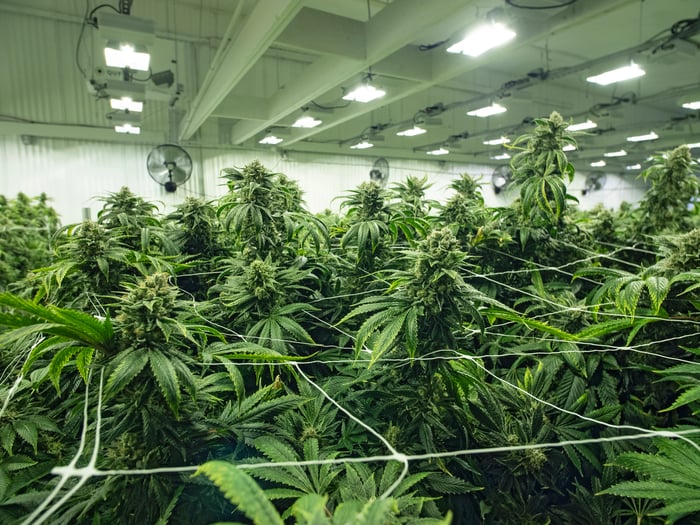Don't blink, because if you do, you might miss big news in the rapidly evolving marijuana industry. Since the beginning of 2018, it's been something of an escalation war between pot stocks in North America following the legalization of recreational weed in Canada and the ongoing state-level legalization of cannabis in the United States.
With Wall Street forecasting that $50 billion (or more) in annual sales could be on the line by 2030, it's not the least bit surprising to see investors piling into pot stocks, and these marijuana stocks spending liberally to gobble up as much market share as possible. But no one was probably prepared for the bombshell that Canopy Growth (CGC -3.13%), the largest publicly traded pot stock in the world by market cap, dropped on investors this past week.

Image source: Getty Images.
Three crazy takeaways from Canopy Growth's one-of-a-kind deal
On the afternoon of April 18, with the stock market still open, Canopy Growth announced that it had secured the right to acquire Acreage Holdings (ACRGF), a vertically integrated cannabis company in the United States, for $3.4 billion, if the U.S. federal government legalizes marijuana. Assuming the deal comes to fruition, it would become the largest acquisition in history, easily trumping the roughly $2 billion that Aurora Cannabis (ACB -1.86%) paid to acquire Ontario pot grower MedReleaf. It would also give Canopy access to the 20 states (including pending acquisitions) Acreage currently holds licenses for retail, production, or processing operations.
Under the terms of the deal, Canopy will provide Acreage shareholders an up-front cash payment of $300 million, or $2.55 per share, with the remainder being converted in common stock at an exchange rate of 0.5818 shares of Canopy stock for each Acreage share held. In total, this represents a nearly 42% premium over the 30-day volume-weighted average price of Acreage's common stock, ending April 16. If Acreage were to back out of the deal, it would owe a $150 million termination fee.
This might all seem relatively straightforward, but this is one of the most complex acquisitions in history that yours truly has ever come across. Here are the three craziest takeaways from this groundbreaking deal.

Image source: Getty Images.
1. Contingent deals of this magnitude are unheard of
First, let's start with the obvious: This contingent deal is unlike anything we've ever seen before. For instance, every so often pharmaceutical or biotech acquisitions will contain a contingent value right that pays the shareholders of the company being acquired a little extra if development, regulatory, or sales milestones are met for select developing drugs. The Bristol-Myers Squibb buyout of Celgene contains a CVR of $9 per share extra that could be paid to Celgene shareholders if three separate developing drugs of Celgene's meet certain milestones.
However, there's a big difference between throwing in something of an icing on the cake for an already-accepted acquisition, and basing the entire acquisition on the premise that the U.S. federal government has to legalize pot. This could be something that happens in a few months, years from now, or never. Sure, it could potentially help secure Acreage at a favorably low price for Canopy if the U.S. weed industry blossoms, but there are no guarantees that'll happen.
There are also legalities surrounding Canopy's entrance that are unlike anything we've ever seen. Co-CEO Bruce Linton has previously said that his company wouldn't enter the U.S. cannabis market, or any country for that matter, until the federal policy allowed for legalized marijuana.
Additionally, reputable exchanges, such as the New York Stock Exchange, which is where Canopy lists its stock, won't allow companies that directly deal in cannabis in the U.S. to list their shares on its exchange. This is why so many pot stocks haven't been able to uplist to the NYSE or Nasdaq. This rule may have been one of the many factors that complicated the deal between Canopy and Acreage.

Image source: Getty Images.
2. It's going to result in massive dilution to Canopy Growth's shareholders
The second crazy aspect of this game-changing deal is that it has a massive share component attached.
On one hand, I do understand why Canopy Growth chose to finance the bulk of this deal with its common stock. With the acquisition basically being contingent on the U.S. legalizing marijuana, and there being no specific timetable on when or if that might happen, I can understand why Canopy wouldn't want to tie up a lot of the $3.7 billion in cash and cash equivalents that it ended the fiscal third quarter with. It still needs this cash to make other complementary acquisitions, develop new products, market its brands, and lay the infrastructure needed to expand into new international markets. The latter of which will be incredibly important if and when Canadian dried cannabis flower becomes oversupplied and commoditized, as has happened in select U.S. states that legalized recreational weed.
Nevertheless, financing more than 90% of the deal with Canopy's common stock would mean ballooning its share count by more than 20%, depending on how much share-based compensation and additional acquisitions are conducted by Canopy between now and when (or if) the Acreage deal goes through. Yes, this move allows Canopy to push into a much more lucrative market. But it's also likely that there would be short-term pain for then-current shareholders as Canopy's outstanding share count balloons higher.

Image source: Getty Images.
3. Aurora Cannabis may lose its spot as the leading global pot producer
Last, but not least, if the Canopy-Acreage deal closes, it might wind up dethroning Aurora Cannabis as the largest global producer of cannabis.
Prior to the this deal, Canopy Growth had more than 4.4 million square feet of licensed cultivation space out of 5.6 million square feet in total grow space. Assuming the company produces marijuana at industry-average rates, it should be capable of 500,000 to 550,000 kilos a year. What we don't know is how much square footage Acreage brings to the table in the United States. However, with operations in 20 states, there's a strong expectation that it would help increase Canopy's global production footprint by quite a bit.
By comparison, Aurora Cannabis is on track to produce as much as 780,000 kilos annually by as soon as 2021 or 2022. Aurora has been actively acquiring production capacity since the beginning of last year, gobbling up MedReleaf, CanniMed Therapeutics, and ICC Labs for $2 billion, $850 million, and $200 million, respectively. Just over a week ago, it announced that its largest organically constructed facility, Aurora Sun, in Medicine Hat, Alberta, was being increased to 1.62 million square feet of cultivation space, which will yield 230,000 kilos, at minimum. But even with this expansion, Canopy's acquisition may lift it to the No. 1 spot, ahead of Aurora.
Furthermore, the combined company would blow Aurora Cannabis out of the water from the perspective of total sales. Right now, Aurora is expected to lead the pack in 2020 consensus revenue, with Canopy Growth a close third. But with Acreage occupying the fourth spot, the combined company would trounce Aurora Cannabis.
This acquisition is a game changer... if it goes through.





